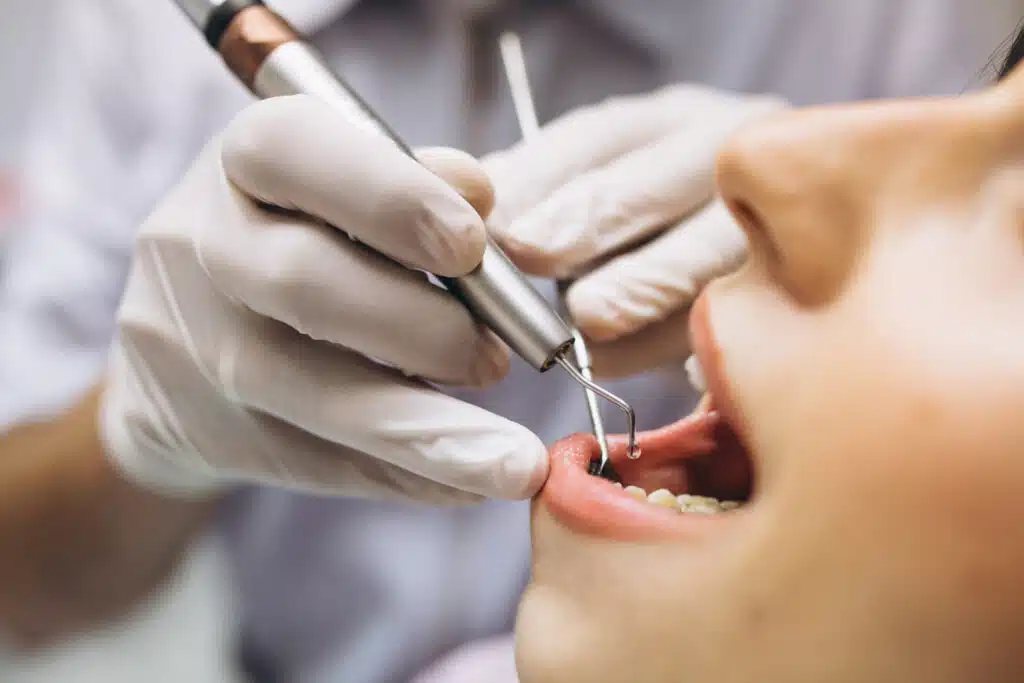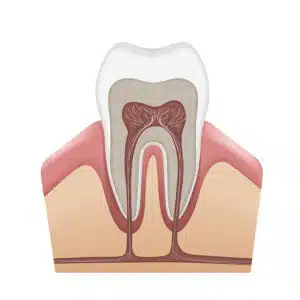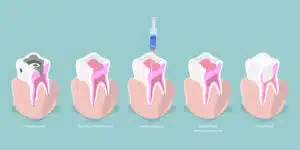
Your smile is one of your most valuable assets, and preserving your natural teeth is essential for maintaining good oral health. When a tooth becomes severely damaged or infected, it’s easy to feel worried and anxious about the prospect of losing it. However, there’s a dental procedure that can save your natural tooth and provide numerous benefits – the root canal.
What is a Root Canal?
A root canal is a dental procedure designed to save a tooth that is badly infected or has severe damage to its pulp, the innermost part of the tooth. The pulp contains nerves, blood vessels, and connective tissue, and when it becomes infected or damaged, it can cause excruciating pain and may lead to tooth loss if left untreated.
During a root canal, a skilled dentist or endodontist removes the infected or damaged pulp, cleans and disinfects the tooth’s interior, and then seals it to prevent further infection. This process allows you to keep your natural tooth and eliminates the pain associated with the infection.
Importance of Saving Natural Teeth
Your natural teeth are unique and irreplaceable. While dental prosthetics like implants and bridges are available, they can never truly replicate the look, feel, and function of your natural teeth. Therefore, preserving your natural teeth should be a top priority.
Here are a few key reasons why saving your natural tooth through a root canal is so important:
- Maintaining Function: Natural teeth are designed to work seamlessly with your jaw and surrounding teeth, allowing you to bite, chew, and speak naturally. Preserving your natural tooth ensures the continued functionality of your mouth.
- Preserving Aesthetics: Your natural teeth contribute to your smile’s appearance. Replacing a missing tooth with a prosthetic may not look as natural and can affect your self-confidence.
- Avoiding Shifting Teeth: When a tooth is lost, neighboring teeth may shift into the empty space, leading to misalignment and potential bite issues. Keeping your natural tooth helps maintain proper dental alignment.
- Preventing Bone Loss: The roots of your natural teeth stimulate the jawbone, helping to maintain its strength and density. Tooth loss can lead to bone resorption, which may affect your facial structure.
Understanding Root Canals
A root canal procedure is often the best course of action when a tooth’s inner pulp becomes infected, inflamed, or damaged due to deep decay or trauma. It’s a common misconception that root canals are painful; in fact, they are performed to alleviate pain and save your natural tooth.
Here’s an overview of what happens during a root canal:
- Diagnosis: Your dentist will start by taking X-rays to assess the extent of the damage and pinpoint the affected tooth. They’ll also discuss your symptoms and medical history.
- Anesthesia: To ensure you’re comfortable throughout the procedure, the dentist will administer local anesthesia to numb the tooth and the surrounding area. You may feel some pressure, but you should not experience pain.
- Access Opening: Once you’re numb, the dentist creates a small access opening in the crown of the tooth. This opening provides access to the pulp chamber.
- Pulp Removal: The infected or damaged pulp is carefully removed from the pulp chamber and root canals. This process eliminates the source of the pain and infection.
- Cleaning and Shaping: The dentist cleans the interior of the tooth and shapes the root canals to prepare them for filling.
- Filling and Sealing: After cleaning and shaping, the dentist fills the empty space with a biocompatible material called gutta-percha and seals the access opening with a temporary or permanent filling. This prevents further infection.
- Restoration: In most cases, a tooth that has undergone a root canal will need a crown to provide strength and protection. The dentist will take impressions to create a custom crown that matches your natural teeth.
Common Myths and Misconceptions About Root Canals
Root canals have earned a reputation as painful and unpleasant procedures, but this is largely a myth. Modern advancements in dental technology and anesthesia have made root canals relatively comfortable. Here are a few common myths and misconceptions debunked:
- Myth: Root Canals Are Painful: Root canals are performed to relieve tooth pain, not cause it. Thanks to local anesthesia, patients typically experience little to no pain during the procedure.
- Myth: Root Canals Cause Illness: There is no scientific evidence to support the claim that root canals lead to systemic health issues. In fact, root canals help eliminate infection and prevent it from spreading.
- Myth: Extraction is Better Than a Root Canal: Saving your natural tooth through a root canal is usually the better option. Tooth extraction may require additional procedures like implants, bridges, or dentures, which can be more expensive and invasive.
- Myth: Root Canals Are Time-Consuming: Most root canals can be completed in one or two appointments, making them a relatively quick and efficient way to save a tooth.
Frequently Asked Questions
1. Are root canals good for your body?
Yes, root canals are generally considered safe and beneficial for your overall health. They remove infected or damaged tissue from your tooth, preventing the infection from spreading to other parts of your body. There is no scientific evidence to support the claim that root canals are harmful to your health.
2. Is it good to avoid a root canal?
Avoiding a root canal when it’s the recommended treatment can have consequences. The infection or damage in your tooth will persist, causing pain and potentially spreading to other teeth or even affecting your overall health. Extraction may become the only option, which can lead to other dental issues and the need for replacement options like implants or bridges.
3. Is a root canal painful?
Modern root canal procedures are performed under local anesthesia, which ensures that you should not feel pain during the treatment. You may experience some discomfort or mild soreness after the procedure, but this can be managed with over-the-counter pain medication.
4. Do root canals weaken teeth?
Root canals do remove the pulp and nerve tissue from the inside of the tooth, which may make it more brittle over time. To prevent this, a crown is typically placed on the tooth after a root canal to strengthen and protect it.
5. Can I eat and drink normally after a root canal?
After a root canal, it’s best to avoid eating or drinking until the anesthesia wears off to prevent accidentally biting your cheek or tongue. Once the numbness subsides, you can resume your normal diet, but be mindful of the temporary filling or crown and avoid very hard or sticky foods.
Choosing the Right Dental Office
Unlock your best smile with Dentistry @ Bonney Lake, your trusted Bonney Lake, WA dentist. We provide top-quality aesthetic dentistry, comprehensive services, and a friendly team committed to your oral health. From implants to whitening, we offer it all. Schedule your appointment today and discover the beauty of your smile. Your journey to a healthier, more radiant smile begins here!
Unlock your best smile with Dentistry @ Bonney Lake, your trusted Bonney Lake, WA dentist, specializing in root canals. We provide top-quality aesthetic dentistry, comprehensive services, and a friendly team committed to your oral health. From root canals to implants and whitening, we offer it all. Schedule your root canal appointment today and discover the beauty of your smile. Your journey to a healthier, more radiant smile begins here!
New Patient Specials
New patients are invited to take advantage of one of our first-time visitor specials!
To claim the offer, screenshot or print the coupon and show it at your initial appointment.
$149 New Patient Special Plus $100 Off Your Second Visit*
**New patients only. A $369 value. Cannot be combined with other offers or insurance.
10% Off Same Day Dental Services*
**New patients only. Cannot be combined with other offers or insurance.
$100 Off When We Treat Two Family Members on the Same Day
**Cannot be combined with other offers or insurance.
New Patient Online Offer
Receive $100 off Future Dental Treatment
with a New Patient Exam
Call (253) 236-7456 today to schedule.
Ready to Book Now? Use our Online Scheduler
BOOK AN APPOINTMENT
Patients choose Dentistry @ Bonney Lake for our convenient scheduling, affordable pricing, outstanding service, and incredible results. Experience the difference today!




